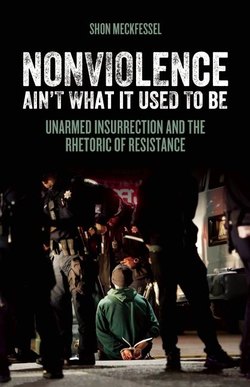Читать книгу Nonviolence Ain't What It Used To Be - Shon Meckfessel - Страница 6
На сайте Литреса книга снята с продажи.
Chapter 2: The Strange Magic of Nonviolence
ОглавлениеI’ve been living my life for twenty years through the word “nonviolence.” After hearing how it was used in Occupy, I think I have to find a new word.
—Nonviolence trainer, Seattle70
I’ve lost track of what “nonviolent” actually means at this point. I am not violent; as a person, my character is deeply not violent. We certainly didn’t do anything that any reasonable person would consider violent inside that bank [lock-down].… In that sense I guess you could say that we were not violent. But I don’t know if I could say that it was nonviolent anymore. At that time I probably would have said it was. We did make a commitment to not actively physically aggress upon either bank employees or customers or the police, and in that sense our tactics were nonviolent ones, but it seems…I don’t know if I would even use that language anymore. In so many conversations, in so many debates over the past few months, I’ve felt this strange magic coming from that word that I don’t know I want to invoke anymore.
—Arrestee in Nov. 2 Occupy Seattle “Chase 5” event71
On November 18, 2011, members of the local Occupy movement at UC Davis were peacefully sitting with linked arms in the Quad, when, before a number of cameras, Lieutenant John Pike casually strolled past them and dispensed a huge quantity of pepper spray into their faces. The incident went globally viral, as commentators compared Pike to Martin Luther King Jr.’s Birmingham antagonist Bull Connor, and the nonviolent nature of the protesters’ conduct was widely cited as a victorious moment for nonviolent protest. Susan Thistlethwaite in the Washington Post, for example, characterized the incident as proof of “the power of nonviolent witness.”72 Author Chris Hedges held the incident up as proof of the Occupy movement’s nonviolent orientation:
The first principles, of course, were nonviolence and non-property destruction.… We don’t accept violent language. When you’re violent you undermine everything. If the protesters in [Manhattan’s] Union Square, who were pepper-sprayed, had been throwing something at the police, you would not have had the movement. It was because they were nonviolent and didn’t react when they were being pepper-sprayed that the movement grew. At UC Davis, when those cops just walked down the line and sprayed, the nonviolent reaction by those kids was fantastic.73
Pike was dismissed from the university, the protesters won a compensation lawsuit of over $1 million, and the Occupy movement was given widespread sympathetic coverage in an increasingly hostile national media environment. The incident functioned as indisputable testimony to the enduring power of “nonviolence.” Or did it?
